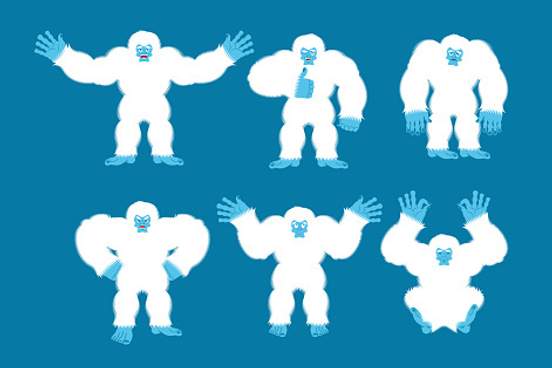
Abominable snowman
Definition: a mysterious creature with human or apelike characteristics reported to exist in the high Himalayas
Abominable snowman makes an appearance in Charles Howard-Bury's chronicle of his Mount Everest expedition entitled Mount Everest: The Reconnaissance, 1921 (published in 1922):
We were able to pick out tracks of hares and foxes, but one that at first looked like a human foot puzzled us considerably. Our coolies at once jumped to the conclusion that this must be "The Wild Man of the Snows," to which they gave the name of Metohkangmi, "the abominable snow man" who interested the newspapers so much.
Journalist Henry Newman, who interviewed the returning members of the expedition, mistranslated the Tibetan name—metoh kangmi, which roughly means "filthy snowman"—for the suspected yeti as "abominable snowman" in his reporting. (Note that Howard-Bury used the misinterpretation in his book.) Newman admits this in a letter to The Times (London) in 1937:
When I asked him what name was applied to these men, he said "Metoh Kangmi." Kangmi means "snow-men" and the word metoh I translated as "abominable." The whole story seemed a joyous creation, so I sent it to one or two newspapers. It was seized upon…. Later, I was told by a Tibetan expert that I had not quite got the force of the word metoh. It did not mean abominable quite so much as 'filthy' and 'disgusting,' somebody dressed in rags.
There is no etymological mysteriousness to abominable snowman: abominable occurs in Middle English as a borrowing from Anglo-French, which is related to Latin abōminārī, "to detest"; snow is from an Old English word, snāw, of the same meaning; man is from Old English mon, "human being." People have been making human figures, in some form or another, out of masses of snow well before the 19th century, but it wasn't until then that they were identified as snowmen

Arms control/race
arms control: limitation of the use, exchange, or manufacture of military weapons by nations often as a policy established through diplomatic negotiation
arms race: a race between hostile nations to accumulate or develop weapons
Arms race starts its run in 1921 with arms control, both of which were triggered by the development of military weapons by competing nations. The resultant arms treaty is also written in 1921 for the treaty controlling the number of weapons accumulated or developed by the nations.
In 1921, the initiative for positive steps toward arms control came from Congress and the public. At first, the [President Warren G. Harding] Administration was close to hostile. But it did not take Harding long to see where his political interests lay. He ordered that a conference be convened. The democratic process worked.
— Gaddis Smith, The New York Times, 24 Apr.1983Protestors against the arms race all over the world carry placards with a slogan: End the arms race, save the human race.
— Feliciano R. Fajardo and Fabian P. Abella, Cooperatives and the Major Economic Systems, 1993Every naval limitation treaty with which we are familiar, from the Rush-Bagot agreement of 1817, limiting vessels of war on the Great Lakes, to the Washington arms treaty of 1921, has resulted in a marked growth of good will and confidence between the nations which were parties to it.
— Herbert Hoover, an address to the U.S. Senate, 7 Jul. 1930
This arms is from Middle English armes, which can refer to weapons, the military profession, or heraldic devices. It is a borrowing from Anglo-French that traces to Latin arma. That word can imply implements of war, weapons in general, equipment, or armor. A common use of arms is in the U.S. Constitution's second amendment for bearing arms: "A well regulated Militia being necessary to the security of a free State, the right of the people to keep and bear Arms shall not be infringed."

Booboisie
Definition: the general public regarded as consisting of boobs
Journalist and language critic H. L. Mencken is often credited with coining booboisie, a blend of boob, as it refers to someone who cares too much about things and too little about ideas and art, and bourgeoisie, the French-derived term for the middle class. In a September 28, 1921 letter to the Freeman, he wrote:
Sirs: You accuse me … of having formulated no definition of democracy. The charge is grievously false. I formulated and printed a definition years ago. Democracy is the theory that the booboisie knows what it wants, and deserves to get it good and hard.
Mencken may have or may not have coined the word, but we're sure the booboisie couldn't care less.

Commissar
Definition: a Communist party official assigned to a military unit to teach party principles and policies and to ensure party loyalty; the head of a government department in the U.S.S.R. until 1946
Commissar was first elected into the English language in 1918 as the title for the head of a government department in the U.S.S.R.; its term ended in 1946, after which minister took over. In 1921, commissar additionally filled the role for a Communist party official who was assigned to a military unit to teach party principles and policies and to ensure party loyalty. It is a borrowing from Russian komissar, from German Kommissar and Commissar, all of which name a person delegated to perform an office. English's commissioner (as in "police commissioner" or "mental health commissioner") is unrelated. It is from a Latin family of words having senses related to commitment, joining together, or bringing about.
During the 1930s, commissar took on an uncivil civil role as a word for a person who attempts to control public opinion or its expression.
He also wanted to take advantage of his current clout as Hollywood's commissar of comedy after producing a string of hits such as Superbad, Forgetting Sarah Marshall and Pineapple Express to attempt a less commercial premise.
— Susan Wloszczyna, USA Today, 27 Jul. 2009

Cat's meow
Definition: a highly admired person or thing
The word meow (which the British spell miaow) refers to the crying sound made by a cat, as is obvious to anyone who has heard a cat's cry. It is unclear how the sound influenced the term cat's meow for someone or something greatly admired, which is a sense heard in 1921. But a meow can be cute sounding and it definitely draws attention.
Leach's report on the Convention was the "Cat's meow," believe me. President Warfield and whole membership should give him a vote of thanks.
— W. Thomas and R. A. Davis, The Sleeping Car Conductor, January 1921
Readers might be familiar with cat's pajamas (or in British English cat's pyjamas), which also begins being heard in the Jazz Age and, like many slang terms, its origin can only be speculated.

Hammer and Sickle
Definition: an emblem consisting of a crossed hammer and sickle used especially as a symbol of Soviet Communism
The hammer is an ancient tool for pounding or delivering repeated blows. The sickle is one that consists of a curved metal blade with a short handle fitted on a tang and used in reaping. These tools are depicted in an emblem used by the dictatorship that was established in Russia by the Bolshevik Revolution of 1917. It represented physical labor in the factory or field. The phrase "hammer and sickle" in reference to the emblem begins being seen in print as early as 1921.
Very few people in Western Europe have paid any attention to the fact that present day Russia is a federated state, consisting of a number of united republics, each of which constitutes within its own boundaries a unified whole, both with regard to nationality of its population and specific economic situation. This is expressed in the name of the new federation, which is Russian Socialist Federative Soviet Republic, usually abbreviated R.S.F.S.R, accompanied by the symbol of the hammer and the sickle.
— Haavard Langseth, Soviet Russia, 23 Apr. 1921The Soviet Navy, Commercial Fleet, Air Force and Coast Guards have new flags. The Navy flag has a red field with a white circle in the centre…. Inside the circle is a large five-pointed red star upon which is emblazoned a hammer and sickle in white.
— Time, 28 Apr. 1924

Headshrinker
Definition: a headhunter who shrinks the heads of the victims; a clinical psychiatrist or psychologist
In 1921, headshrinker appears as a word to identify members of certain peoples who practiced shrinking the decapitated heads of their enemies. The modern-day headshrinker does nothing brutal, we think. Today's headshrinker (or shrink) merely "gets into" a patient's head and helps "shrink" the problems lurking there down to manageable size. Sci-fi writer Robert A. Heinlein felt his readers needed the term to be explained when he introduced it in Time For The Stars in 1956: "'Dr. Devereaux is the boss head-shrinker.' I looked puzzled and Uncle Steve went on, 'You don’t savvy? Psychiatrist.'"
Shrink, as the name for a psychiatrist or psychologist, is a shortened form of headshrinker. Shrink in this sense is used in various ways, informally, humorously, and derogatorily, and it dates to the mid-1900s.
It was Dr Hilarius, her shrink or psychotherapist.
— Thomas Pynchon, The Crying of Lot 49, 1965

Cover charge
Definition: a charge made by a restaurant or nightclub in addition to the charge for food and drink
The act of covering can be a generous one: a person might cover (pay for) a bill or even a cover charge. The term cover charge evolved from the sense of cover meaning "a tablecloth and other table accessories," and early print evidence suggests it is from 1921. This quote from the December 1917 issue of The Hotel Monthly gives hint to how the two words (cover and charge) came to be seated together by that year:
In the common acceptance of the word, until a very recent day, the word "cover" carried also the table condiments and bread and butter. In recent years, however, owing to the advanced cost of foods, and the necessity for economy, an extra charge is very generally made in restaurants for bread and butter, and, also, for some of the more costly condiments and sauces which formerly were served free. The word "cover" is also extensively used in banquet service, as, for instance, a charge of $5 the cover, which includes everything provided,—food, special menu card, flowers, music, service of every kind.

Crash
Definition: to force (one's way) through with loud crashing noises; to enter or attend something (such as a party, dance, sports event, etc.) without invitation or without paying
In the Random House Historical Dictionary, there is a citation from 1921 for the colloquial sense of the verb crash referring to the act of breaking into a place, and it quite possibly could be an indicator of when the sense begins being used along with other related senses referring to entering a place forcefully or without invitation, ticket, or payment.
We had successfully "crashed the gate.” The scenes we saw in the gambling parlors have been described too often for me to take the time to enumerate here….
— Charles F. C. Ladd Jr., Around the World at Seventeen, 1928
Unsurprisingly, the noun form crasher was only a step behind, and it was accompanied by gate-crasher (formed from the act of a person breaking through an entrance gate).
It took nearly two hours for the big post-Inauguration parade to pass the White House reviewing stand: 30 floats, 50 bands, 400 horses and one gate crasher dressed as Abraham Lincoln and wearing roller skates. He was Franklin Burke, 50, of St. Petersburg, Fla. "I campaigned for Carter," Burke explained at one point, "and I feel very proud to be here as Abraham Lincoln."
—David M. Alpern et al., Newsweek, 31 Jan. 1977
And of course, nowadays we have "party crasher" and "wedding crasher." They have been the uninvited for a while as these quotes show:
A rare breach of security allowed an apparent party-crasher into a New Year's celebration for President and Mrs. Reagan at the desert estate of publishing magnate Walter Annenberg, the Secret Service says.
— The Associated Press, 10 Jan. 1984SHERRI SYLVESTER: The August 19th ceremony did not go off without a hitch. There was a wedding crasher. ALEC BALDWIN: He turned out to be from The Enquirer and he crashed the party.
— CNN, 30 Sept. 1993

Pogo
Definition: a pole with a strong spring at the bottom and two footrests on which a person stands and moves along with a series of jumps
In 1921, Pogo was trademarked for what is now commonly known as the pogo stick, and the trademark was modified verbally and nominally.
Pogoing is also considered very much the thing, an international Pogo record was established, when a Pogoer actually Pogoed up a broad staircase six steps at a time.
— American Exporter, January 1922
In the 1970s, Pogo became associated with the punk rock scene. It got a gig as a verb (in lowercase form) referring to the hopping up-and-down dancing going on at shows.
During an early Sex Pistols gig at the 100 club and before he joined the band, "Sid Vicious started jumping up and down on the spot with excitement, bashing into people. And this was the first recorded incident of pogoing in the U.K."
— Dave Laing, One Chord Wonders: Power and Meaning in Punk Rock, 1985

RBI
Definition: a run in baseball that is driven in by a batter; official credit to a batter for driving in a run
RBI is an abbreviation for "run batted in." Although batters have gotten RBIs and runs have been batted in since the beginning of baseball, RBI begins its streak in 1921 as a baseball initialism. About mid-century, sports writers and fans begin using the nickname ribbie (also ribby), as in "The third baseman picked up five ribbies in the game."

Goon
Definition: a stupid person; a man hired to terrorize or eliminate opponents; a player (as in ice hockey) known for rough play and fighting
Early print evidence of the noun goon for a simpleton occurs circa 1921. A writer of a "letter to the editor" published in the November 14, 1938 issue of Life confirms this use: "The word 'Goon' was first popularized by college students who used it to mean any stupid person."
The noun is probably short for gooney, an English dialectal of the same meaning.
The racketeering "thug" or "hachet man" sense is employed shortly after.
All election night long, the Manila radio rebroadcast calls from outlying areas pleading for protection from goons lurking near the polling places—and all night long Mrs. Keith listened to the pleas and sometimes to the sound of gunfire, as the aroused voters fought their way to the ballot boxes.
— Time, 21 Nov. 1955
It is then drafted in sports, particularly ice hockey, for a player (the enforcer) who is known for rough play and fighting usually in retaliation for the roughness given by a member of the opposing team.





